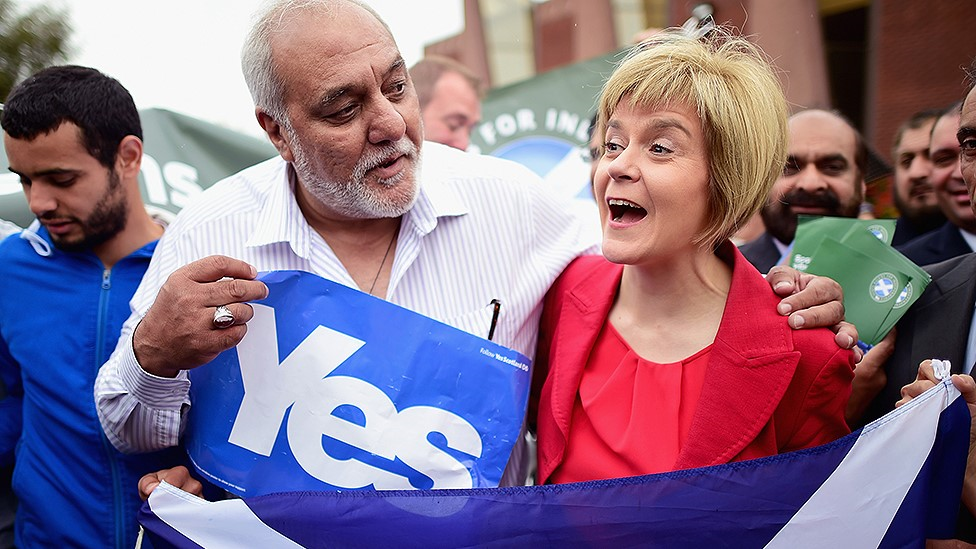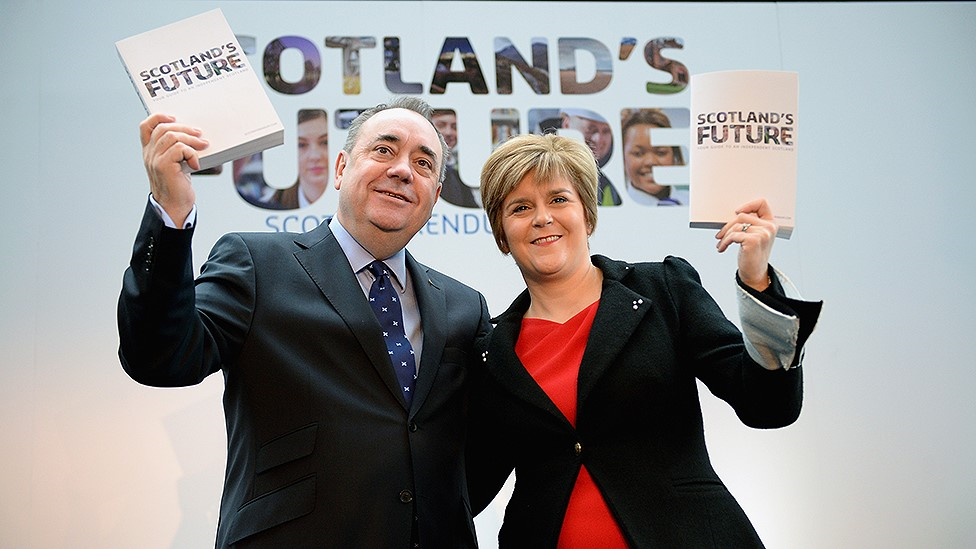Scottish independence referendum: What happened in 2014?
- Published

Scotland voted 'no'
Should Scotland be an independent country?
"No", was the answer the majority of the Scottish public gave seven years ago when asked in an independence referendum.
In 2014 we were told by both campaigns - the winning "no" side with 2,001,926 votes, and the losing "yes" team with 1,617,989 with votes - it was a "once in a generation" decision.
But now Scotland's First Minister Nicola Sturgeon wants another one.
Why was there an independence referendum in 2014?
The SNP - Scottish National Party, which Nicola Sturgeon leads - secured 69 seats in the 2011 Scottish Parliamentary Election.
That's four Members of the Scottish Parliament (MSP) more than it needed for a majority, and five more than she got in last week's vote.
Independence is the SNP's main aim and the then prime minister agreed, based on those election results and the number of MSPs, Scotland should be asked about its future.
Why does the SNP want independence?
The Scottish parliament makes decisions on things like education and housing for its citizens.
Health is the main issue that's devolved - meaning Scotland doesn't need to follow the policies the UK government sets out - and that's why, during the pandemic, we've seen different rules coming from Scotland, Wales, Northern Ireland and England on Covid-19 restrictions.
Nicola Sturgeon's SNP party campaigns for more powers and argues Scotland should be able to make all its political decisions, so things like defence and foreign policy.
What did both sides say in 2014?
For younger voters things like university tuition fees, defence and the economy were key issues.
Those wanting independence argued free university fees in Scotland could continue but those against said financially that wasn't possible.
If Scotland had voted "yes" it would have broken up the UK's armed forces and would have needed to start its own one.
Radio 1 Newsbeat's coverage at the time included a debate a week before the September 2014 vote.
Watch highlights from Radio 1's Scottish referendum debate
Who could vote in the 2014 referendum?
For the first time in the United Kingdom's history, 16 and 17-year-olds were able to vote in Scotland.
In total more than three and a half million had their say on their future.

Nicola Sturgeon was the deputy first minister at the time of the 2014 referendum
Why does Nicola Sturgeon think there should be a second vote now?
The First Minister of Scotland argues that as her party is the largest in the Scottish Parliament - despite not having a majority - it shows people want change.
The SNP, along with the Green party, said in the 2021 election that if they had the most votes they would put forward plans for another referendum.
But, based on how people voted in last week's constituency vote, more people overall went for candidates who were against a second shot at independence - but it is pretty much 50/50.
Nicola Sturgeon has been saying for years things have changed - especially after the 2016 European Union referendum.
What has Brexit got to do with this?
The majority of Scottish people backed remaining part of the European Union in the Brexit vote.
It was a decision made two years after Scotland said it didn't want to be independent at a time when the UK was in the EU.
Independent campaigners say Scotland can re-join the EU if it separates from the UK but there's no agreement in place to confirm that will happen.
Will there be another vote on Scottish independence?
If you listen to Nicola Sturgeon she says it's "when - not if".
But if you listen to Boris Johnson he says the focus should be on coronavirus recovery.
The law says any change to how the UK is run is decided by politicians from across the United Kingdom, meaning any potential vote will need to have the support from the parliament in Westminster.
It could go to court, especially as neither side seem to be up for a compromise.


Follow Newsbeat on Instagram, external, Facebook, external, Twitter, external and YouTube, external.
Listen to Newsbeat live at 12:45 and 17:45 weekdays - or listen back here.